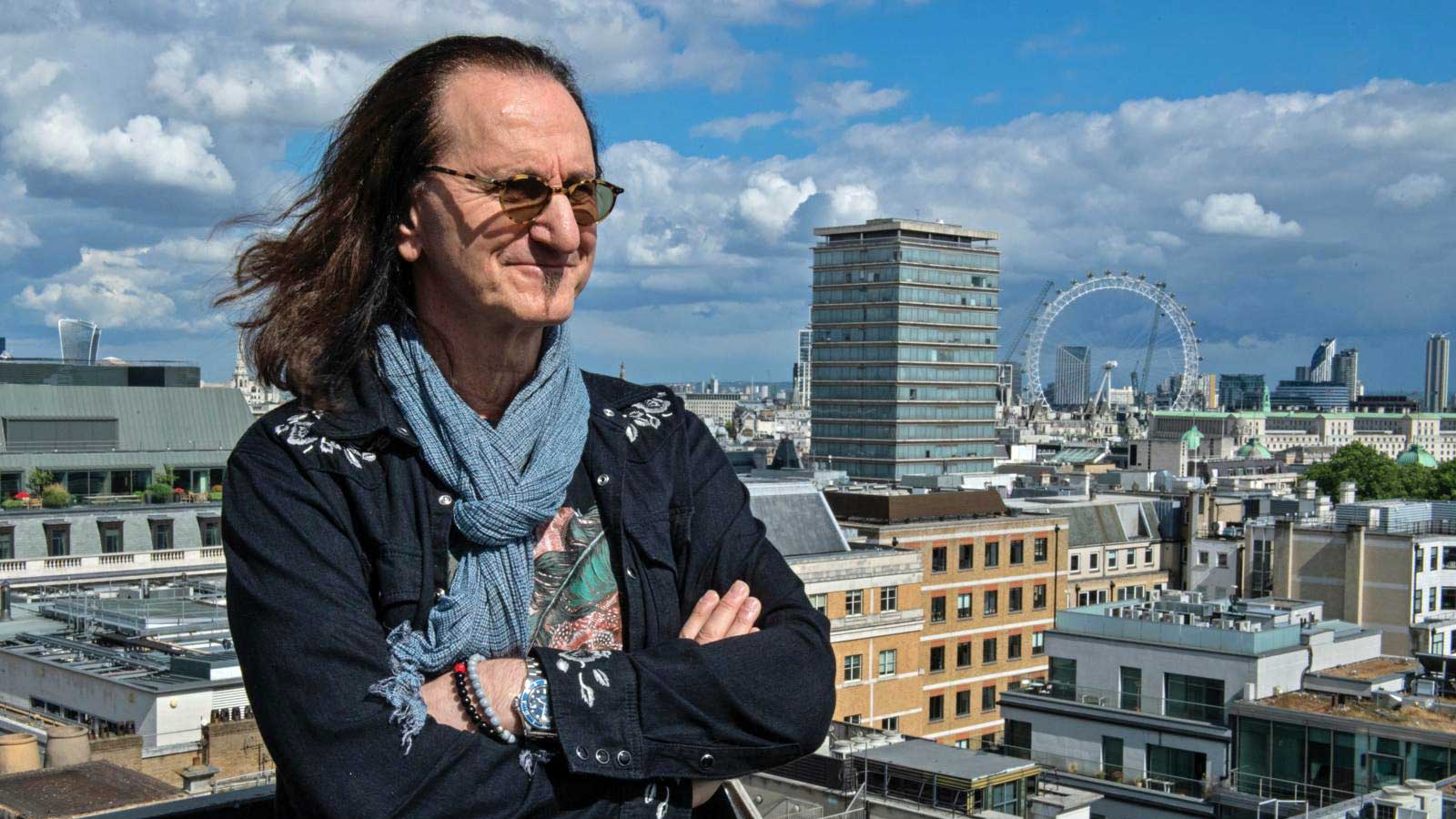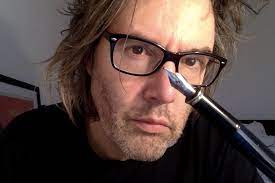Geddy Lee is currently on the road in Canada, performing a series of In Conversation shows to promote his recently published autobiography, My Effin' Life. The run of dates – which includes five in the UK – will feature the Rush bassist reading key passages from his the book, before guest interviewers and the audience can pose questions directly.
"Writing this book has meant spending so much time living in the past," Lee says. “I’ve never lived my life looking anywhere but forward, which is why I resisted doing this kind of thing for so long."
Lee dipped his toes in the literary water in 2019, scheduling a run of signing sessions to publicise his first publication, Geddy Lee’s Big Beautiful Book Of Bass. And Classic Rock's Philip Wilding went along for the ride.

Saturday June 8, 2019: 3pm
It’s a balmy Saturday afternoon in London’s Piccadilly, and the queue snaking out of the door of Waterstones bookshop goes around the corner, then disappears into an alleyway and doubles back on itself. It’s like a slowly moving tableau of the history of Rush; every album cover represented on worn cotton, spread across a series of bellies, some more pronounced than others.
Following this happy throng through the shop and down the stairs to the basement, I find a grinning Geddy Lee standing there, a marker pen in hand ready to sign literally hundreds of copies of his book, Geddy Lee’s Big Beautiful Book Of Bass. Grown men walk through the door, see that the one-time Rush frontman is just a few feet away and gasp.
One drops his iPhone, many nudge the person next to them and laugh almost hysterically. By the time they get to the signing table, Lee’s manager Meg almost has to remind them to take a breath. Some freeze as they approach, glassy-eyed until Lee prompts them with: “Where have you come from today?” and “Do you play the bass?”
There are people here from the US, from Brazil, from all over the UK, just waiting for their short moment in the light next to Lee. One man tries to tell Geddy how he saw him live with Rush and was convinced that Geddy was winking at him. Geddy sizes him up with a nod and says: “You’re kind of a good-looking guy, might have happened.” The man is so deliriously happy with this response that he’s led away looking like he’s been tasered.
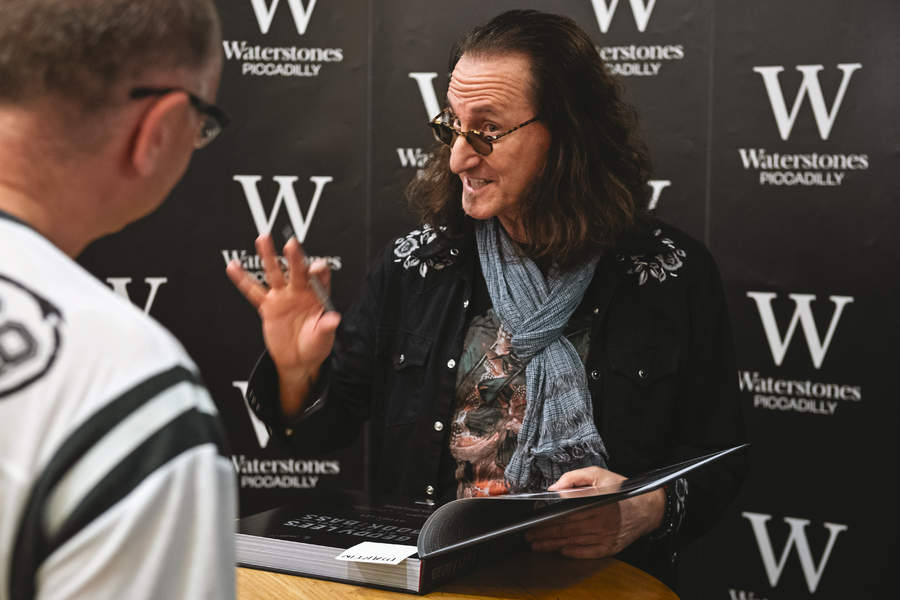
5.30pm
“Let’s be honest,” Geddy says, “I’d rather be playing music for three hours a night with my two goofy friends than doing this, but in lieu of that, this is kind of a nice thing.”
We’re six storeys above London. Through the windows of Waterstones the towers of the Palace Of Westminster are just visible among the distant jumble of blocks that make up a famous part of the city’s skyline.
“I like meeting the fans. I like it when the families come, I like seeing three generations. The other day this guy said: ‘‘I brought my dad. He’s eighty-two, he’s never done a fist-bump.’ I said: ‘I’ll teach him, don’t worry.’ Lot of tears, too, which kind of makes me well up. I had a woman come up to me and she said that the music really helped get her through a tough time in university. I said: ‘I’m glad the music meant something to you,’ and then she burst into tears! But it’s a really nice human experience for me, that the band has meant so much to them and they’re never going to see that band.”
It’s been four years since Rush’s R40 tour rolled out of Los Angeles and out of sight forever. As brilliantly as Rush had blown up, they retreated from the world with a quiet dignity. It’s true to say that Lee and guitarist Alex Lifeson held out of hope of a reunion, but Neil Peart’s promise of one final tour was steadfast and the drummer and lyricist retreated into retirement in the coves of Santa Monica.
Lifeson has made musical and TV cameos, while Lee travelled widely and then went down his self-confessed rabbit hole of collecting and curating. It was wine, it was baseball, briefly it was art. But his yen to collect and study the bass guitar took a real hold. At the last count he was up to nearly 300 instruments, quite a few of which made it on to the R40 shows. It seemed almost inevitable that they’d make it into a book.
I’d see him every time he passed through London and interviewed bass players for his book: Bill Wyman, Adam Clayton… A particular favourite was John Paul Jones. “He came to my house alone in the back of a cab with a very rare bass, no ego.”
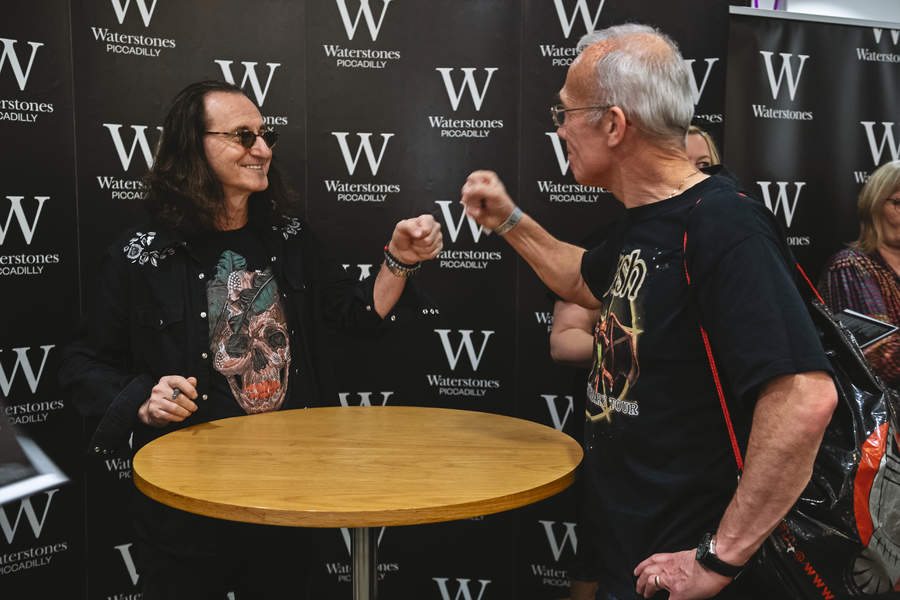
6.30pm
Most of the crowd have drifted away by the time Geddy and Meg take the back exit of the book shop to head to dinner. There are just three punters left, clutching old gig tickets, record sleeves and concert programmes. Meg, with the kind of speed you’d associate with a Ninja, negotiates them down to one piece of memorabilia apiece for Geddy to sign.
One hesitates, helplessly holding up a programme and gig ticket, looking from one to the other before his friend remonstrates with him: “Man, don’t fuck this up for us!” He eventually opts for the programme.
8.30pm
The restaurant is cool and quiet, our table pooled in soft white light. Geddy insists I try my first Vesper Martini, a cocktail created for James Bond creator Ian Fleming. He then pours our first glass of red wine of the evening.
“I find days like today so surprising,” he says, swirling the wine. “Everywhere has been great, but the people today were so warm and so gracious. I’m still amazed that it means so much to these people, and that makes it all the nicer for me and for them.”
Monday June 10, 2019: midday
We’ve already missed one train to Manchester. The blue sky is long gone, and just outside of Euston station the road is flooded. By the time we make the Virgin Express the view from our window is a smudged stream of greens and blacks.
Manchester is the second of three signing dates (Glasgow is the third); tonight’s event is an elongated interview, an audience Q&A and then the signing itself.
“I haven’t done any official kind of signing since My Favorite Headache in 2000,” says Geddy, coffee in hand. “So it’s been twenty years. It’s fun. That said, my back doesn’t like it and I’m developing different chops in my wrist – I am standing up there for two hours signing books.”
He holds up his phone to show me a photo of a vintage Rush ticket for a gig at Manchester’s Free Trade Hall in 1977. “All The World’s A Stage tour, I’d guess.” A quizzical furrow forms a line between his eyebrows. “One pound fifty, wow! We went to Wales to record A Farewell To Kings after that.”
He certainly didn’t expect the kind response the tour has generated. Not just from the fans coming out to meet him, but also in terms of actual book sales. The book went to No.1 in Canada and stayed there for two weeks. It peaked in the UK at No.3. As I write, he’s just started another stretch of dates in the US, where the initial run of books sold out in shops and on sellers like Amazon.
Maybe book tours are the new rock’n’roll?
He raises an eyebrow. “Rock’n’roll is still rock’n’roll!” he says. “I realised that promoting a book is different from a record, because a record has shelf life, but a book like this has a life of its own. So I plan on doing this right through to next Christmas. I’ll appear here and there and it doesn’t seem to matter where it is.”
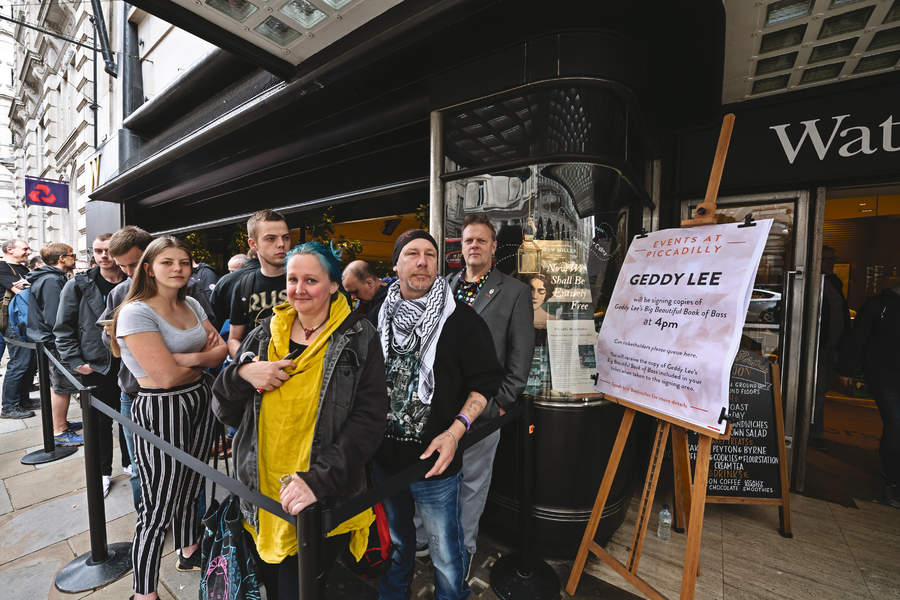
9pm
“The Free Trade Hall, that’s a hotel now,” someone says to me on the stage at the packed out Dancehouse theatre that night, the venue doubling up as the interview room and a signing stage. Rush are playing through the venue’s PA as Geddy signs and fist-bumps his way into the night.
10.30pm
We’re sitting in the Malmaison hotel eating and drinking late. Some fans have camped out in the foyer, grabbing one last picture, but it’s finally a late dinner, more martinis, another bottle of red. Geddy’s talking about the audiences he gets when he’s signing a book rather than playing the opening to 2112.
“There are obviously more Rush fans than bassists, sadly,” he says. “Some are guitar players, and there are a few drummers, but the majority are bass players, and they want to tell me that they picked up the bass because of listening to a Rush song, and that makes me happy, that we passed that on.”
Tuesday June 11, 2019: 10.30am
We’re at Manchester Piccadilly train station, standing under a slate-grey sky when another fan appears out of nowhere. This one wants to tell Geddy how his uncle was one of the people who helped build Le Studio, the recording rooms where Rush made their commercial mark. Lee’s headed north to Glasgow. Even with a cap pulled down hard over his eyes he’s easy to spot. Then it’s on to Amsterdam and Hamburg, the end of this European tour, at least for the moment.
“When I have some time I’ll pop into a few cities and I’ll do some signings,” he says as he heads for his platform. “I don’t have to have a big master plan. I don’t know what’s coming up in my future, but I imagine that I will get back to some other kind of musical employment sooner or later. But whatever I choose to do in the future, the book will tag along with me. I can do both. At least I hope I can.”
Geddy Lee's My Effin' Life is out now. Tickets for the In Conversation shows are available from Ticketmaster.
